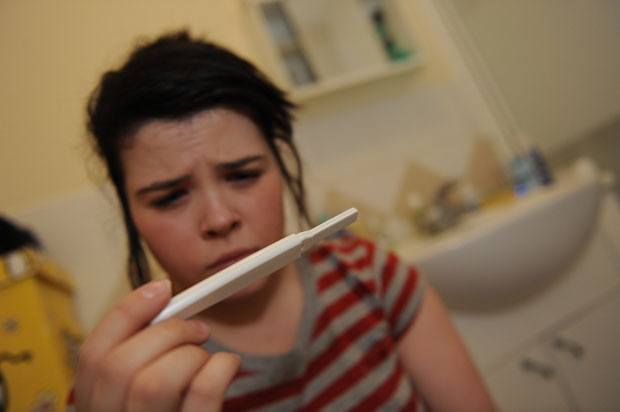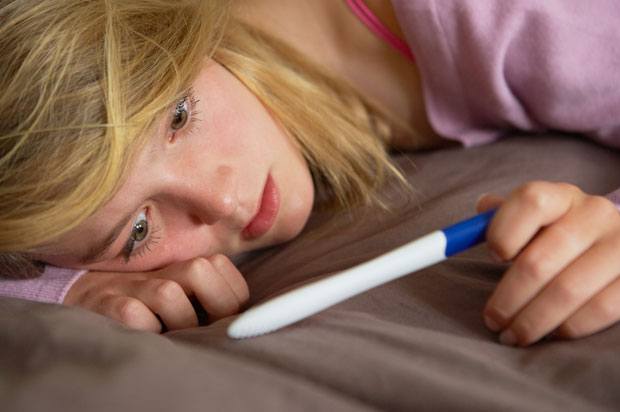Pregnancy testing
Whether you've missed a period or you're feeling a bit peculiar, taking a pregnancy test will help you know for sure whether you're pregnant, so you can decide what to do next.

Getting pregnant can be worrying or wonderful - but either way you need to know.
When to take a test
If you think you’re pregnant, it might seem like a really long wait, but doctors recommend you don’t take a test until your period is a day overdue. If you can’t tell whether your period is late or not, because of an erratic cycle, or because you’ve taken the pill without a break, then you should wait three weeks after unprotected sex before you take the test. Lots of home pregnancy tests claim to be able to give results earlier than this. The First Response Pregnancy Test for example, can detect pregnancy hormones in 52% of women three days before their period is due.
If you’ve decided you want to take a pregnancy test, first you’ll need to think about how you’re going to feel either way. Whether it’s negative and you’re not pregnant, or it’s positive and you are, you could be left feeling happy, disappointed or even distraught. It may be worth having a trusted friend or family member on hand for emotional support.
Go to see your doctor
Your doctor (GP) will be able to give you a very accurate pregnancy test, with instant results, as well as offering you confidential advice on what to do next. At many doctors’ surgeries tests are free and if you’re uncomfortable using your family doctor, you can ask to see someone else without giving any reasons.
Go to a family planning clinic
Many family planning clinics offer free pregnancy testing. Brook, for example, offers free tests to under 25s. It also offers counselling and will carefully go through all the options available to you, without pressuring you in any direction.
Take a urine sample to a pharmacist
Some pharmacists offer confidential pregnancy tests. That way you don’t have to worry about interpreting it yourself.
Buy a home pregnancy testing kit
Home pregnancy testing kits can be bought from chemists and most supermarkets. They are easy to use, on the whole, and can be very effective. Consumer tests show them to be, on average, 97% accurate when taken correctly and on the day your period is overdue. They vary slightly in price, but you can get a twin pack from about £5. Clearblue has developed a digital test, for about £8 for two, which displays the words “pregnant” or “not pregnant” to avoid any confusion over colours and lines.
How they work
Most home tests involve you either peeing on a stick, or dipping a stick into a urine sample. It’s not complicated, but you have to make sure you remember several things:
- Pee on the right end of the stick;
- Pee on the stick for the right amount of time;
- Most tests recommend that you use them first thing in the morning.
The results take just a few minutes to show, but you can only read them for a certain amount of time. After this time the result can change to show a wrong result.
Possible problems
When taking a home pregnancy test, it may be possible to get a false result. This can be a false negative reading, which is slightly more common, or a false positive reading, which is very rare, so you should bear in mind that a positive result is a good indication of pregnancy.
A false negative can be caused by:
- Taking the test too soon: This is the most common reason for a false negative, because the hormone that shows you are pregnant is not detectable yet;
- Using the test incorrectly: Almost all other false negatives come from the test being used incorrectly, so make sure you read the instructions very carefully.
A false positive result can be caused by:
- A ‘chemical pregnancy’: This is basically a very early miscarriage that you wouldn’t usually notice, and you go on to have a normal period afterwards;
- Medication: There are a few drugs which have the pregnancy hormone in that may give a positive result – these are usually infertility treatments, but if you’re unsure ask your doctor;
- Using the test incorrectly: A false positive can be caused by using the test incorrectly.
The contraceptive pill, implants and the contraceptive injection won’t affect your results as they don’t produce the hormone which pregnancy tests detect.
What next?
If you’re at all unsure about whether you’re pregnant, there’s no harm in taking another test, or going to see your doctor to confirm anything. If you get a positive result make an appointment with your doctor for health advice and counselling, whether you want to keep the baby or not.
Next Steps
- Chat about this subject on our Discussion Boards.
By Lily Eastwood
Updated on 29-Sep-2015
No featured article










